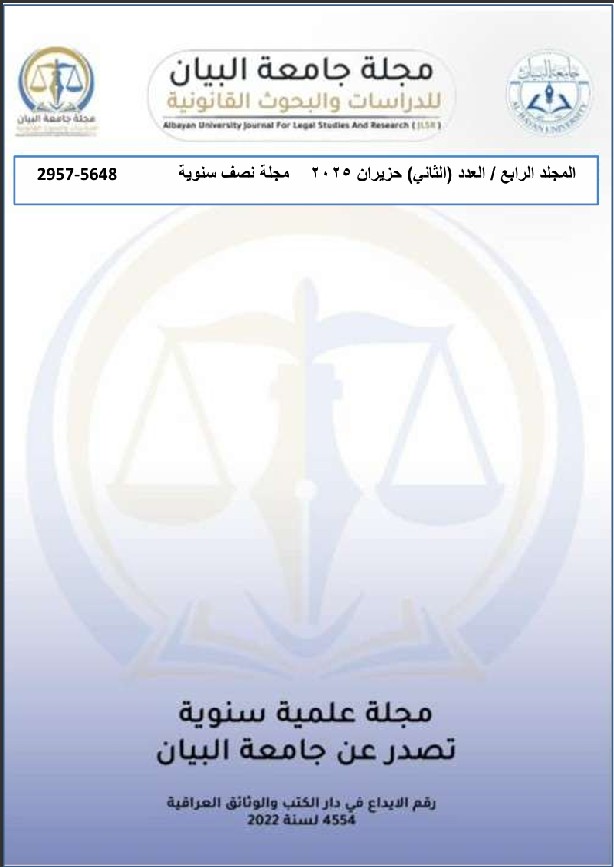The Electoral System in Iraq: Legal and Political Challenges and the Prospects for Comprehensive Reform
DOI:
https://doi.org/10.65263/aujlsr.V4.I2.Y2025.P260-279.118Keywords:
الكلمات المفتاحية: النظام الانتخابي، الابعاد القانونية، الابعاد السياسيةAbstract
This research provides a comprehensive study of the electoral system in Iraq from 2005 to the present, with a focus on the legal and political implications resulting from the plurality of electoral systems and their repeated amendments. The study demonstrates that the frequent changes to electoral laws have weakened fair representation and reduced opportunities for independent political entities, thereby reinforcing identity-based alignments and sectarian power-sharing. These changes have also negatively impacted the effectiveness of the Iraqi parliament in terms of legislation and government oversight, as the fragmentation of parliamentary blocs and the absence of a clear majority have led to weakened accountability and political deadlock. The research concludes that these challenges pose significant obstacles to the establishment of a stable democratic state and emphasizes the necessity of comprehensive electoral system reforms to enhance political justice and ensure the stability of the democratic process in Iraq.
References
First: Arabic References
1. Muhammad Kazem Al-Mashhadani, Political Systems, Al-Atak for Book Publishing, Cairo, Egypt, 2009,
2. Luna Abdul Kareem Dawood & Ibtisam Hatim Alwan, “Electoral Systems and Their Role in Seat Allocation,” Journal of Political Issues, No. 79, 2019
3. Ahmad Fadel Hussein, “The Legal Organization of Electoral Campaigning,” Journal of the Scientific Researcher, No. 9, 2010
4. Ayman Ayoub, Local Democracy in the Arab World: Regional Report, International Institute for Democracy and Electoral Assistance (IDEA), Stockholm, 2010
5. Salim Souza, “Consociational Democracy in Iraq: Reproducing Ethnic, Religious, and Linguistic Minorities as Political Minorities,” Arab Politics Journal, Arab Center for Research and Policy Studies, No. 51, Doha, 2021,
6. Mustafa Abdul Razzaq, “The Largest Bloc in the Iraqi Political System: A Study in Legal and Political Dimensions,” Iraqi Constitutional Studies Journal, No. 7, 2021.
7. Abdul Rahman, “Political Frustration and Its Impact on Electoral Participation in Iraq,” Iraqi Journal of Political Science, 2022.
Secondly: Documents
1. The Constitution of the Republic of Iraq (2005), General Secretariat of the Council of Ministers – Official Gazette Bureau (Ratified version dated December 28, 2005), Article 49, Section One, Clause (First).
2. Article 49 of the 2005 Constitution of the Republic of Iraq, Law No. 26 of 2009, amended in 2013: Adoption of the Sainte-Laguë method.
3. Iraqi Election Law No. 9 of 2020, Iraqi Official Gazette, Issue No. 4536, dated October 12, 2020.
4. Independent High Electoral Commission, Report on Voter Turnout in the 2021 Elections, Baghdad
Thirdly: Foreign References
1. Donovan, T., Brockington, D., Bowler, S., & Brischetto, R. "Minority Representation under Cumulative and Limited Voting". The Journal of Politics, 60(4), 1998
2. Al-Ali, Z.. "Electoral Systems and Political Representation in Iraq: The Impact of the Sainte-Laguë Method". Journal of Middle Eastern Politics, 13(2), 2019
3. United Nations. Guidance Note of the UN Secretary General on Democracy.2006
4. United Nations Human Rights Committee. General comment No. 25 (Participation in public affairs and the right to vote), 1996
5. United Nations Assistance Mission for Iraq (UNAMI). Report on the 2018 Iraqi Elections, 2018
6. Taghreed Abdul Qadir Ali, Faridah Jalil & Hanan Alqaisi, “Assessing the Impact of Government Accountability and Parliamentary Oversight Committees: The Parliamentary Investigation Committees in the Iraqi Council of Representatives,” International Journal of Innovative Research and Development, Vol. 4, No. 11, 2015
7. Inter-Parliamentary Union. Declaration on Criteria for Free and Fair Elections.1994.
8. Diamond, Larry & Dawisha, Adeed. "Electoral Systems Today: Iraq’s Year of Voting Dangerously." Journal of Democracy, 17(2).2006
Fourthly: Electronic Links
1. Political blocs’ disputes hinder the formation of the Iraqi government, Al-Watan Newspaper, 2020.
Link: https://www.alwatan.com.sa/article/
2. Abdulaziz Alawi Al-Eisawi, Emerging Powers and the Electoral Law: Options to Avoid the Sainte-Laguë Formula, Bayan Center for Planning and Studies, Baghdad, 2023.
Link: https://www.bayancenter.org/
3. Ashley Weiland, Muhannad Adnan, Electoral Law: Signaling a Short-Lived Run for Iraq's Independent MPs?, Washington Institute for Near East Policy, 2023.
Downloads
Published
Issue
Section
License
The authors retain Full copyright of their published article
Al-Bayan University Journal for Legal Studies and Research (AUJLSR) applies the Creative Commons Attribution 4.0 International (CC BY 4.0) License to articles and other works we publish. If you submit your paper for publication by AUJLSR, you agree to have the CC BY 4.0 license applied to your work.
Articles can be read and shared for under the following conditions:
BY: Attribution must be given to the original source (Attribution)
Full details available at
https://creativecommons.org/licenses/by/4.0/



